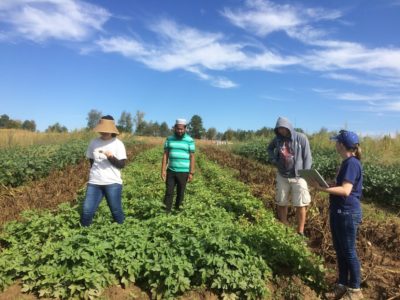Blog by Marc Ghislain, David Douches, Jan Fierro, and Kelly Zarka
Late blight disease is enemy number one to potato farmers worldwide. In sub-Saharan Africa, small-holder farmers with limited resources face production losses between 15 and 60% every year. This translates to over US$129 million in lost revenues. In search for a solution to this devastating disease, researchers have been hard at work seeking alternative solutions to heavy uses of fungicide. A recent field trial of a biotech potato, conducted by Michigan State University’s (MSU) Potato Breeding and Genetics Program using the 3R potato technology developed by the International Potato Center (CIP), has shown a high level of resistance to late blight.
This gene-based control of the disease is supported by Feed the Future, the US government’s global hunger and food security initiative funded through USAID, and 2Blades Foundation, who have embraced biotechnology as a viable solution. Three resistance genes (R genes) from potato wild species were transferred into existing popular varieties grown in Uganda and Kenya. Field trials of these biotech potatoes in Uganda, referred to as 3Rpotato (transgenic), have shown that they can resist late blight without fungicide sprays while their non-transgenic equivalents required up to 15 sprays. The trials were conducted in collaboration with the National Agricultural Research Organisation (NARO).

Likewise, biotechnologists and breeders at MSU transferred the 3R gene technology from CIP into the Diamant potato variety, widely grown in Bangladesh. In the field, the transgenic potatoes stayed healthy while the non-transgenic became heavily infected by potato late blight pathogen and soon died.
“The field results were amazing, seeing healthy potatoes next to devastated ones only thanks to 3 resistance genes from wild relatives” says David Douches MSU project director of the Feed the Future Biotechnology Potato Partnership. This research is another proof that we are today more than ever able to provide our crops with resistance to lethal diseases.
“The findings in the US are remarkable in that it confirms what we have seen in Uganda: biotech potatoes with complete resistance to late blight” says Marc Ghislain leader of the 3R potato project at CIP. More field tests of these late blight resistant potatoes are taking place in Bangladesh, Indonesia, and Uganda. “The impact these resistant varieties can have on small-holder farmers’ futures is great. Many do not have the resources to purchase fungicides and use them safely. Farmers can be seen applying the chemicals with little or no protective clothing, often with bare feet and sandals. The reduction or elimination of fungicides not only reduces the cost of the crops, but also protects the health of the farmers and their communities.”
Farmers, who are excited about the results in the field, will have to wait as the 3R potatoes make their way through the regulatory process in each country. Hopefully, their wait will be a short one. Biotech crops are gaining greater acceptance across the globe as the technology has been proven to work remarkably and be safer than use of pesticides. Countries such as Uganda and Kenya have taken bold steps. Uganda’s parliament recently approved the Biotechnology and Biosafety bill which will ensure the safe use of biotech crops. “With this biosafety legislation put in place, farmers are moving closer to accessing disease resistant crop varieties, opening up countless benefits,” concludes Marc Ghislain.
Watch: Dr. Marc Ghislain discusses the recent findings on Biotech potato with high level of resistance to late blight.
